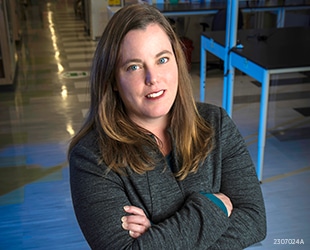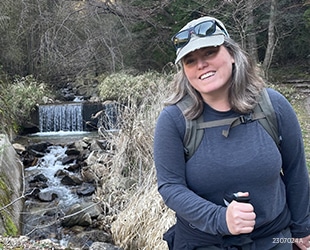Andrea Bild: Tracking the Evolution of Cancer
Cancers use many tricks to try to defeat the therapies that are used against them. Andrea Bild, PhD, and her team are dedicated to fighting back with sophisticated methods to spot those tricks and throw cancer on the defensive.
Bild, who received a fellowship from AACR early in her career, is now a professor in the department of medical oncology and therapeutics at the Beckman Research Institute of The City of Hope in California.
“One of the main focus areas of our research,” she explains, “is evolution of cancer, its heterogeneity, and how these factors contribute to cancer drug resistance. Then we ask, what are approaches we can take to either avoid resistance from occurring or to effectively treat resistant cancer?”

Bild hopes to develop a new clinical trial approach that enables one to track a patient’s cancer from one point of its evolution to the next using integrated molecular and clinical data, trying to stay ahead of the tumor’s ability to change. This approach is different than many current trials that test one drug regimen at a time.
“I’d like to work towards changing current approaches to one where we stay on top of the cancer and personalize the care of each stage as the patient is getting treated,” she says.
Hailing from Dunedin, Florida, Bild sampled intellectual pursuits ranging from economics to zoology at the University of Florida. But she got hooked on biology while volunteering in the lab of Howard Johnson, PhD, studying interferon gamma signaling in breast cancer.
“It was a lot of fun to work on the complexity of signaling in cells,” she says, and that fascination with signaling has stuck with her ever since.
Bild’s next stop was at the University of Utah, where she earned a doctorate in pharmacology. She liked the focus on signal transduction in different disease states and therapeutic strategies to target aberrant signaling. As a postdoc at Duke University, Bild was busy developing a multidisciplinary program incorporating pharmacology, cell biology, and genomics. She needed funding and came across the AACR Anna D. Barker Fellowship in Basic Cancer Research Award. She successfully competed for it in 2005 to study signal transduction pathway networks in patient tumors using genomics. She said the award boosted her career development and is the type of grant critical to other young researchers.
“Fellowships give you financial support to pursue your scientific vision and recognize that you have the capability to succeed in this field,” she said. “They give you confidence to keep chugging away despite all the hurdles that you face.”
Bild has focused on tumor cell phenotypes, the collection of characteristics that allow a tumor to behave one way or another, and on how they change when confronted with therapy.
In breast cancer, for example, the most common and treatable form of the disease is endocrine receptor positive – ER+ for short. Having this breast cancer subtype means the cells of the tumor have receptors that allow them to respond to the hormone estrogen. Lowering estrogen levels or blocking the estrogen receptors (via what is referred to as estrogen therapy) slows down or stops the growth of the cancer cells.
Although estrogen therapy has been beneficial, nearly all patients with ER+ metastatic breast cancer will become refractory. The good news is that more drugs continue to be developed, including those referred to as CDK 4/6 inhibitors. These therapies have improved the progression-free survival of many patients.
Unfortunately, sometimes these newer therapies also stop working. To gain insights into this process, Bild and colleagues studied samples from patients with progressive cancer in order to identify and specifically target the signaling pathways used by the cancer cells.
They found that some subclones of cancer cells survive chemotherapy and become dominant in the tumor, contributing to eventual recurrence and metastasis of the cancer. Treatment-resistant cancer cells exhibited specific phenotypes that enable them to grow despite treatment and identifying them could help treat the disease.
In trying to untangle the mass of recalcitrant cells and aberrant signaling pathways, Bild uses an approach called systems biology.
“My definition of systems biology is the integration of computational and mathematical approaches with experimental or patient-based data. So it’s the convergence of multiple areas of expertise being used together to address complex scientific questions.” she explains.

“Importantly, we can develop computational approaches to study the evolution of cancer heterogeneity as well as how normal cells interact with cancer cells during the progression in patients on treatment,” she added. These cell interactions in a tumor may contribute to resistance signaling and provide new opportunities for treatment strategies.
Bild’s team has also developed biomarkers that measure a tumor’s response to breast cancer treatments using machine learning and genomic data. These biomarkers are currently being tested in a clinical trial exploring whether they can help guide treatment for the cancer and improve the progression-free survival of the patients.
“There is enormous opportunity to leverage complex patient genomic and clinical data using AI and other mathematical models to personalize care based on cancer cell phenotype and microenvironmental signaling,” Bild remarked. “In this way, we can improve the continuum of patient care using a complexity of data and algorithms that can better match the complexity of cancer.”
When she isn’t studying cellular pathways, Bild likes to spend time on other pathways, such as trails through the woods in Utah or Southern California. Recently she completed a trek on the Nakasendo Trail in Japan.
“I remain grateful to AACR for their support of my research and my colleagues who collaborated on the research project,” she said.